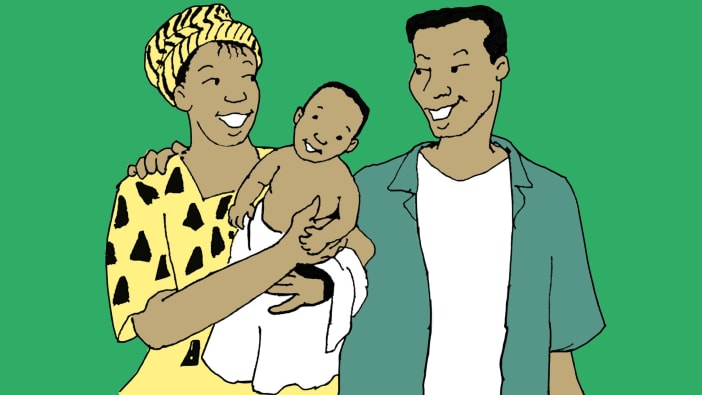by Allison Mathews.
Menstruation is a natural event, affecting women and girls of reproductive age. For most women it occurs once a month. Each month the uterus produces a special lining, rich in blood, which will protect and feed the fertilised egg if the woman becomes pregnant. If the egg is not fertilised, this lining is no longer needed, and is discharged. A menstrual period marks the beginning of a new monthly cycle, and the formation of a new egg. A regular menstrual cycle indicates a fertile, healthy, and well-fed woman.
The average age for girls in Bangladesh to start menstruating is twelve. A woman’s reproductive life lasts until the age of 40 or 45.
What is sanitary protection?
This refers to the materials and methods a woman uses to avoid staining her clothes during menstruation. The ways in which women cope with this monthly need vary greatly. Upper middle class women in urban areas rely on disposable sanitary towels. Poor women use a variety of inexpensive, reusable materials.
Cotton cloth torn from an old sari is the most widely used material. These rags are usually held in place with string, and are washed and reused for up to three years. Because of the recent expansion of the clothing industry, panties are now widely available and affordable. A growing number of women find them more comfortable and secure for holding rags in place.
Do poor women want disposable sanitary towels?
Most women are not able to spend money on sanitary protection. Sabiha, a village woman from Sylhet commented, ‘Disposable sanitary towels would be convenient for any woman as they do not need to be washed and stored, but we cannot think of spending money for menstruation. For us there is no cost involved with menstruation, as we use old clothes.’
What are menstruation myths and restrictions?
In Bengali culture, women are generally considered unclean during menstruation. A menstruating woman is thought to have the power to pollute or destroy. She is also considered to be at risk from evil spirits. Because of these beliefs, a woman is expected to alter her movements and behaviour when she is menstruating. She should not eat certain foods, such as meat, eggs, fish and leafy vegetables at this time since they are believed to increase her polluted state.
People commonly believe that a menstruating woman…
- should not sleep with her husband as this would harm him.
- must not touch a holy book or say her prayers.
- must not go near cows. If she does, it is believed that the cows will produce less milk and become ill.
- must not visit ill people or mothers with new-born babies. This would bring harm or cause illness.
- must not touch the container where rice is stored. This would destroy
- rice production and bring bad luck to the family.
- should not leave her home because she may be attacked by evil spirits which can make her infertile.
How are menstrual rags cleaned?
Menstrual rags are considered to be harmful and shameful, and therefore must not be seen by men or boys. Most women rinse the rags in the latrine and then wash them more thoroughly outside, sometimes with soap. After washing the rags they then dry them inside, hidden in a narrow corner, under the bed or in the rafters. After each menstrual period the rags are washed, dried, and stored in a secret place.
What health problems do women face?
Because cultural restrictions require rags to be dried indoors, they may not dry completely. Washing rags in river or pond water without soap, drying them in damp and dark conditions encourage mildew and bacteria. When rags are stored between periods, they are sometimes infested with insects. Repeated use of such rags causes rashes that lead to more severe health problems such as infections.
Menstruation often causes physical discomfort, cramps and tiredness. Food restrictions imposed on menstruating girls and women, such as forbidding them meat, fish, eggs, and certain vegetables, may increase feelings of tiredness and add to their overall poor nutrition.
What cultural problems do women face?
The cultural taboos surrounding menstruation and sanitary protection impose many restrictions on a woman, disrupting her regular activities. The belief that menstrual blood and menstruating women are polluted reinforces a woman’s own feeling of shame and low self-image.
What can be done?
Education and awareness raising The first step towards addressing the problems is education and awareness-raising. Unless parents and husbands appreciate and understand the normal functions of a girl’s body, she is unlikely to feel good about herself. Adolescent girls must be given pride in the normal functions of their bodies. Both men and women should be reached by educational campaigns. Many organisations run health extension programmes. Menstruation and sanitary protection should be a specific focus in these programmes, and the following areas should be covered…
- An explanation of the physical aspects of the menstrual cycle, and the reasons for menstruation.
- Menstruation is a natural, healthy, and positive event.
- It is important to eat nutritious foods during this time.
- Many taboos are restrictive and negative.
Health and hygiene Health education programmes should also address the hygienic care of sanitary protection materials. Women should be made aware that…
- the repeated use of unclean rags can lead to infections
- rags should be washed with tube well water
- rags should be washed with soap or washing soda
- rags should be dried in the sun
- storing rags in a plastic bag will avoid insect infestation (but they should be properly dried first)
- using panties to hold rags in place may be more comfortable than string.
Other ways of addressing the problems include campaigning for more hygienic facilities for women, such as bathrooms at schools and work places.
The belief that menstruation is unclean strengthens a woman’s feelings of shame and low self-esteem.
Questions for Group Discussion
- Are there similar taboos concerning menstruation in your own culture?
- Are girls encouraged to take pride in the functioning of their bodies – or are they made to feel ashamed?
- Where can women discuss these issues openly? Where can they obtain medical advice without feeling ashamed?
- How can men become more understanding of the needs of women?
Allison Mathews prepared this report while working with poor women in Bangladesh for two years. She now works with Intermediate Technology, who would be interested to hear from other groups raising awareness of these issues. Please contact Mahjabeen Chowdhury, IT Bangladesh, GPO 3881, Dhaka 1000, Bangladesh.








